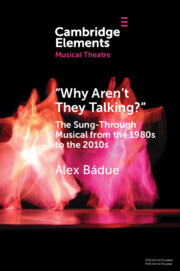Refine search
Actions for selected content:
3 results
Chapter 15 - Opera
- from Part III - Composition, Creation, and Reception
-
-
- Book:
- Leonard Bernstein in Context
- Published online:
- 06 April 2024
- Print publication:
- 28 March 2024, pp 123-130
-
- Chapter
- Export citation
Chapter 14 - Exotic Evocations
- from Part III - Composition, Creation, and Reception
-
-
- Book:
- Leonard Bernstein in Context
- Published online:
- 06 April 2024
- Print publication:
- 28 March 2024, pp 114-122
-
- Chapter
- Export citation

“Why Aren't They Talking?”
- The Sung-Through Musical from the 1980s to the 2010s
-
- Published online:
- 24 February 2022
- Print publication:
- 10 March 2022
-
- Element
- Export citation
